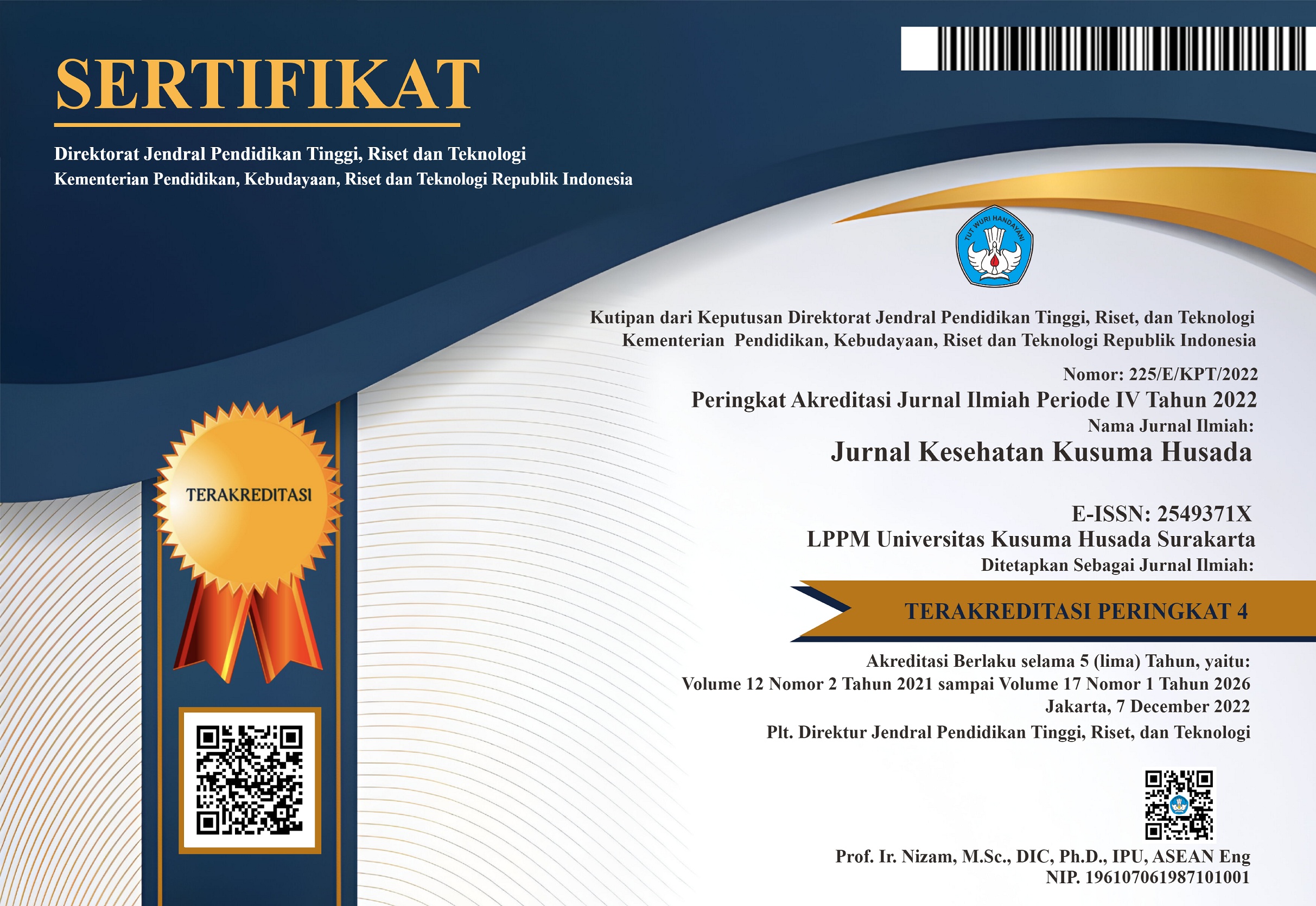HUBUNGAN TINGKAT EKONOMI KELUARGA, ASUPAN MAKANAN DAN STATUS GIZI DENGAN PERKEMBANGAN MOTORIK HALUS BALITA DI DESA BULU KABUPATEN SUKOHARJO
DOI:
https://doi.org/10.34035/jk.v9i1.252Keywords:
beban kerja, konflik, perawatan pasien, pengembangan karir, stres kerja, family’s economic level, food intake, mild psychomotor development, nutritional status, toddlersAbstract
Kekurangan gizi pada balita masih menjadi masalah di Indonesia. Dampak dari kekurangan gizi adalah terganggunya pertumbuhan dan perkembangan balita. Tujuan penelitian untuk mengetahui hubungan antara tingkat ekonomi keluarga, asupan makanan, dan status gizi dengan perkembangan motorik halus di Desa Bulu Kabupaten Sukoharjo. Jenis penelitian observasional analitik cross sectional menggunakan proportional random sampling dengan jumlah 58 responden. Pengumpulan data menggunakan jumlah kalori dalam bentuk AKG, recall 2x24 jam. Status gizi dengan mengukur tinggi badan / berat badan berdasarkan tabel Z-Score. Tingkat ekonomi keluarga dengan standar UMK. Perkembangan motorik halus menggunakan KPSP. Uji statistik menggunakan Pearson yang dilakukan di Desa Bulu Sukoharjo. Hasil analisis korelasi menggunakan uji pearson diperoleh hubungan yang signifikan antara tingkat ekonomi, dengan motorik halus (p=0,045). Hasil analisis korelasi diperoleh nilai r= 2,64 maka tingkat ekonomi mempunyai kekuatan hubungan cukup kuat dan berkorelasi. Status gizi (p=0,032) dengan hasil r= 0,283 maka status gizi mempunyai kekuatan hubungan cukup kuat dan berkorelasi. Begitu juga dengan asupan makanan (p=0,000) dengan hasil r=612 maka asupan makanan mempunyai hubungan cukup kuat dan berkorelasi. Kesimpulan terdapat hubungan yang bermakna antara tingkat ekonomi, asupan makanan, dan status gizi dengan perkembangan motorik halus balita
Malnutrition in toddlers is still a big problem in Indonesia. The impact of malnutrition is the disruption of toddlers’ growth and development. The purpose of this study is to determine the relationship between family economic level, food intake and nutritional status toward the mild psychomotoric development of the toddlers in Bulu Village, Sukoharjo District. The type of this research is observational analytic study with cross sectional by using proportional random sampling with 58 respondents. The data collection method uses the number of calories in the form of AKG, recall 2x24 hours. The nutritional status is obtained by measuring the height / weight with Z-Score table. The economic level of family is measured with the standard of City’s Minimum Wage (UMK). The development of mild psychomotor is measured with KPSP. Pearson’s statistical test was conducted in Bulu Village, Sukoharjo. The result of correlation analysis by using Pearson test gained significant relationship between the level of the economy with the mild psychomotor (p = 0.045). The result of correlation analysis is r = 2.64 so that the economic level has strong relation and is correlated. The nutritional status (p = 0.032) is r = 0.283 so that the nutritional status also has a strong relation and is correlated. In addition, food intake (p = 0.000) results in r = 612 so that the intake of food has a strong relation and is also correlated. The conclusion, there is a significant relation between the level of economic, food intake and nutritional status of toddlers toward their mild psychomotor development.
References
Downloads
Published
Issue
Section
License
The copyright of the published articles belongs to Jurnal Kesehatan Kusuma Husada.

This work is licensed under a Creative Commons Attribution 4.0 International License.
















